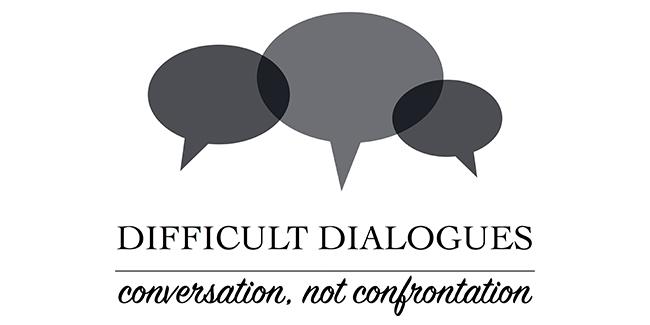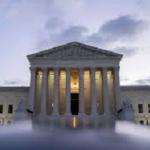Exactly one year ago, an important event in which I was both involved with planning and execution, occurred on our campus. It was controversial and cutting-edge. After attending the event, a colleague who has been on the faculty for twenty-five years told me that she had never been prouder of our college. Over the next three Sundays I will be looking back at the context, planning, and reality of that event, which the President of the college intends to be the first in a series of dialogues called “With Mutual Respect.” Here is some of the background.
Over the past several years on my campus, events called “Difficult Dialogues” have regularly been scheduled. These are moderated conversations on sorts of controversial topics that tend to drive people into entrenched corners from which they yell across the conceptual divide at those with whom they disagree. Faculty, students, and administrators are invited to think ahead of time about current controversies on campus before coming to a “Difficult Dialogues” event—these topics have tended to be related to race and/or sexual orientation and gender identity. I have attended several of these events and have found them fruitful; listening and conversing in person is always better than yelling and posturing online.

I teach some version of an ethics class just about every semester, so I have the opportunity to guide conversations on controversial topics regularly—for instance in my most recent ethics course, we concluded the semester with race issues followed by gun control. Twenty-five years ago. I was still a relatively new faculty member at the college, teaching a section of “Current Problems in Ethics” in our night school.
Our classroom was on the fourth floor of the oldest building on campus, a long, narrow, unwelcoming room that, fortunately, disappeared when the building was completely renovated a decade or so ago. My thirty students were a mixture of day students, seeking to pick up an extra three credits toward their core requirements, and adult continuing-education students. This motley crew also included two young Catholic diocesan priests—not unusual, given that my campus is run by the Catholic Dominican order. The final “current problem” on the syllabus that semester, a topic on which we spent four or five two-hour classes, was perhaps the most controversial moral issue that one can raise on a Catholic college campus: Abortion.
The fact that I don’t remember much of anything from that class indicates that the fireworks must have been minimal. What I do remember, however, was that one of the priests—the one who always sat in the front row about five feet away from me—approached me at the end of our final class. “I want to thank you for including the abortion issue on the syllabus,” he said. “I learned a lot from the time we spent on it.” A bit surprised, I asked him what he had learned. “I started the class as pro-life as a person could possibly be,” he said, “and I still am as pro-life as a person can possibly be. But I learned, contrary to what I had always believed, that there are strong arguments in favor of the pro-choice position. I learned that a person can be a good, loving, person and also be pro-choice. I learned to stop immediately thinking that a person who is pro-choice is evil, a baby-killer, and condemned to hell. Going forward, I will try to listen more and to judge less. Thank you.”
I thought of this exchange for the first time in years this morning as I read Caitlyn Flanagan’s article “The Things We Can’t Face” in a recent edition of The Atlantic. The theme of this edition is “How to Stop a Civil War.” Flanagan’s article leads off the middle section of the oversized volume, a section titled “Appeals to Our Better Nature.” The subtitle of her article is “What we don’t talk about when we talk about abortion.” Flanagan effectively describes what is at stake, of course, but her primary purpose is powerfully simple. We cannot talk about this extraordinarily difficult issue—or any difficult issue for that matter—if we do not first open ourselves to the possibility that people of good will and good faith can disagree on the most important of topics without demonizing or dehumanizing each other.
Toward the end of her article, Flanagan describes the lay of the land clearly.
The argument for abortion, if made honestly, requires many words: It must evoke the recent past, the dire consequences to women of making a very simple medical procedure illegal. The argument against it doesn’t take even a single word. The argument against it is a picture. This is not an argument anyone is going to win. The loudest advocates on both sides are terrible representatives for their cause . . . The truth is that the best argument on each side is a damn good one, and until you acknowledge that fact, you aren’t speaking or even thinking honestly about the issue. You certainly aren’t going to convince anybody. Only the truth has the power to move.
What is an article about abortion doing in a volume dedicated to discussing the polarizing impasse in politics that we have reached in this country? Flanagan takes neither a pro-life nor a pro-choice stance in her article; instead, she shows that we do everyone a tragic disservice when we reduce various positions to caricatures that can be fit neatly on a bumper sticker or in a tweet. Nothing important can be reduced without remainder in that way. And yet this is what we do to those with whom we disagree on a regular basis. The second half of the passage above from Flanagan’s article could be a description of the lay of the land in any of the dozens of issues and matters that divide us.
The “Difficult Dialogues” series was put on hiatus during both 2020 and 2021 on campus for obvious Covid-19 pandemic related reasons. By the Spring 2022 semester, all classes were back to fully in person and in-person events on campus were returning. The stage was set for challenging conversations to return, just in time for a Supreme Court decision that changed everything. Stay tuned!













